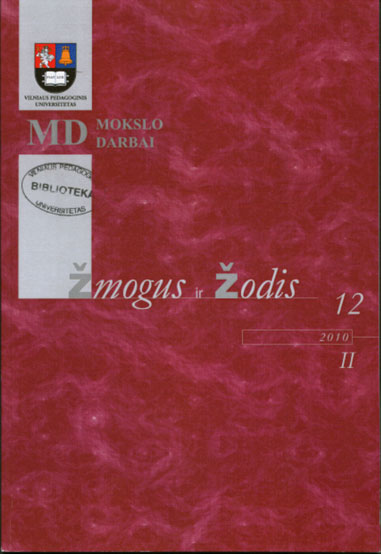Vinco Mykolaičio-Putino „Viršūnės ir gelmės“: pabaigos poetika
“The Peaks and the Depths” by Vincas Mykolaitis-Putinas: Poetics of the End
Author(s): Vigmantas ButkusSubject(s): Literary Texts
Published by: Vytauto Didžiojo Universitetas
Keywords: compositional complication; double ending; dream; space timer; the Providence.
Summary/Abstract: The aim of this article is to consider poetical peculiarity of an important poetry cycle by Vincas Mykolaitis-Putinas The Peaks and the Depths (Viršūnės ir gelmės), to be more precise, of the last cycle’s poem “The Lullaby” (Lopšinė), which hasn’t been analyzed so far. That peculiarity appears due to compositionally complicating the end of the cycle, however it isn’t just of a compositional-poetical level, but it also influences the notional structure and worldly perceived entirety of the whole cycle and even of the whole collection Between Two Dawns (Tarp dviejų aušrų). The opposition of “the peaks” and “the depths”, raising the main tension in the whole work, looked upon from totally another and different perspective in the finale of “The Lullaby” seeming to be the one and entire “bottom” (the depth) is being transformed into such “bottom” (the depth). Whereas the real, eternal, unchangeable “peak”, the zenith is the all-seeing “eye of the Creator” – a traditional symbol of the Providence. That peak is the one for which the lyrical subject of the work doesn’t have any claims absolutely. On the contrary, though implicitly but unconditionally it admits its inaccessibility, eternity and omnipotence. The following conclusions are drawn: (1) “The God”, “The Creator” of the first cycle’s poem are the figures of absolutely different quality and level than “the watchful eye of the Creator” of “The Lullaby”; (2) if “the watchful eye of the Creator” shining in the zenith, symbolizing the highest, real divinity is considered eternal and inaccessible, reasoning about the Prometheism of Mykolaitis-Putinas’ symbolic phase should be performed with considerable reservation and more stipulation than it is performed, for example, by Antanas Maceina; (3) in the cycle “The Peaks and the Depths” (and in the collection Between Two Dawns) Mykolaitis-Putinas’ aspirations as a priest and on the whole catholic ideology that the world is guarded, patronized and ruled by the Providence participates actively and essentially; (4) still a cosmologically and theologically monumental space timer of “the Lullaby” formally is introduced just as a space timer of the dream reality, i.e. at the same time as catholically fundamental and possibly subjectively subconscious, as it is dreamy, thus fragile, instantaneous – like being questioned or “checked”.
Journal: Žmogus ir žodis
- Issue Year: 12/2010
- Issue No: 2
- Page Range: 58-63
- Page Count: 6
- Language: Lithuanian

